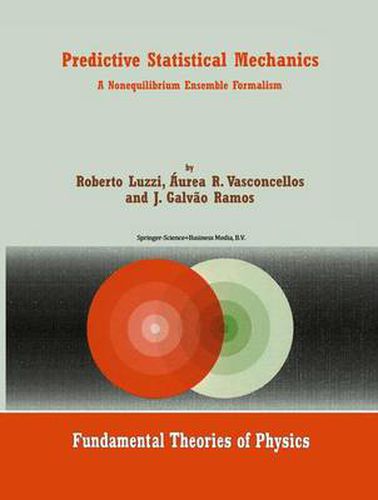Readings Newsletter
Become a Readings Member to make your shopping experience even easier.
Sign in or sign up for free!
You’re not far away from qualifying for FREE standard shipping within Australia
You’ve qualified for FREE standard shipping within Australia
The cart is loading…






This title is printed to order. This book may have been self-published. If so, we cannot guarantee the quality of the content. In the main most books will have gone through the editing process however some may not. We therefore suggest that you be aware of this before ordering this book. If in doubt check either the author or publisher’s details as we are unable to accept any returns unless they are faulty. Please contact us if you have any questions.
Within the framework of Jaynes’ Predictive Statistical Mechanics , this book presents a detailed derivation of an ensemble formalism for open systems arbitrarily away from equilibrium. This involves a large systematization and extension of the fundamental works and ideas of the pioneers Gibbs and Boltzmann, and of Bogoliubov, Kirkwood, Green, Mori, Zwanzig, Prigogine and Zubarev, among others. Chapters One to Five include a description of the philosophy, foundations, and construction (methodology) of the formalism, including the derivation of a nonequilibrium grand-canonical ensemble for far-from-equilibrium systems as well as the derivation of a quantum nonlinear kinetic theory and a response function theory together with a theory of scattering. In Chapter Six applications of the theory are catalogued, making comparisons with experimental data (a basic step for the validation of any theory). Chapter Seven is devoted to the description of irreversible thermodynamics, providing a far-reaching generalization of informational-statistical thermodynamics. The last chapter gives an overall picture of the formalism, and questions and criticisms related to it are discussed. The book is directed at an audience of researchers in the field of statistical mechanics and thermodynamics of open nonequilibrium systems. In addition, it is relevant for the study of far-from-equilibrium processes in condensed matter, particularly semiconductor physics, as well as molecular hydrodynamics, rheology, many-body systems with complex behaviour and areas of engineering, and so on. It can also be used as a complement to advanced graduate courses in statistical mechanics.
$9.00 standard shipping within Australia
FREE standard shipping within Australia for orders over $100.00
Express & International shipping calculated at checkout
Stock availability can be subject to change without notice. We recommend calling the shop or contacting our online team to check availability of low stock items. Please see our Shopping Online page for more details.
This title is printed to order. This book may have been self-published. If so, we cannot guarantee the quality of the content. In the main most books will have gone through the editing process however some may not. We therefore suggest that you be aware of this before ordering this book. If in doubt check either the author or publisher’s details as we are unable to accept any returns unless they are faulty. Please contact us if you have any questions.
Within the framework of Jaynes’ Predictive Statistical Mechanics , this book presents a detailed derivation of an ensemble formalism for open systems arbitrarily away from equilibrium. This involves a large systematization and extension of the fundamental works and ideas of the pioneers Gibbs and Boltzmann, and of Bogoliubov, Kirkwood, Green, Mori, Zwanzig, Prigogine and Zubarev, among others. Chapters One to Five include a description of the philosophy, foundations, and construction (methodology) of the formalism, including the derivation of a nonequilibrium grand-canonical ensemble for far-from-equilibrium systems as well as the derivation of a quantum nonlinear kinetic theory and a response function theory together with a theory of scattering. In Chapter Six applications of the theory are catalogued, making comparisons with experimental data (a basic step for the validation of any theory). Chapter Seven is devoted to the description of irreversible thermodynamics, providing a far-reaching generalization of informational-statistical thermodynamics. The last chapter gives an overall picture of the formalism, and questions and criticisms related to it are discussed. The book is directed at an audience of researchers in the field of statistical mechanics and thermodynamics of open nonequilibrium systems. In addition, it is relevant for the study of far-from-equilibrium processes in condensed matter, particularly semiconductor physics, as well as molecular hydrodynamics, rheology, many-body systems with complex behaviour and areas of engineering, and so on. It can also be used as a complement to advanced graduate courses in statistical mechanics.